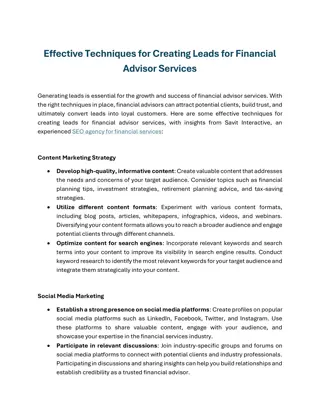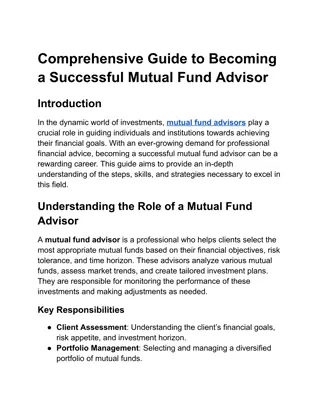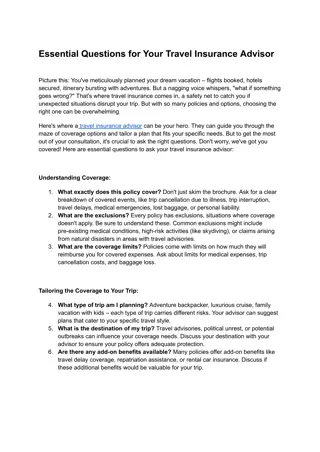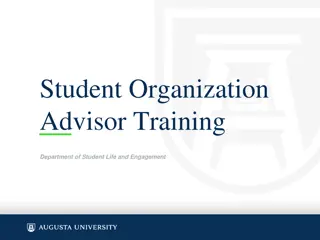
The Role of Advisors in Live Hearings
Learn about the crucial role of advisors in live hearings, including their responsibilities in cross-examination, questioning, and more. Find out how parties can select advisors and the obligations of assigned advisors during the hearing process.
Download Presentation

Please find below an Image/Link to download the presentation.
The content on the website is provided AS IS for your information and personal use only. It may not be sold, licensed, or shared on other websites without obtaining consent from the author. If you encounter any issues during the download, it is possible that the publisher has removed the file from their server.
You are allowed to download the files provided on this website for personal or commercial use, subject to the condition that they are used lawfully. All files are the property of their respective owners.
The content on the website is provided AS IS for your information and personal use only. It may not be sold, licensed, or shared on other websites without obtaining consent from the author.
E N D
Presentation Transcript
Overview Advisor Required Role of Advisor Live Hearing Questioning Cross-Examination Rape Shield Bias
Advisor Required Parties may have advisors throughout the process, and must have them at the hearing. - Parties may select their Advisor. - If a party does not select an advisor of choice, institution must assign an advisor for purposes of the hearing. 34 CFR 106.45(b)(6)(i).
Role of Advisor Advisor must conduct cross-examination on behalf of party. 106.45(b)(6)(i). - Whether advisors also may conduct direct examination is left institution s discretion, but any rule to this effect must apply equally to both parties. 85 FR 30342. - Cross must be conducted directly, orally, and in real time by the party s advisor and never by a party personally. 106.45(b)(6)(i).
Role of Advisor - Advisor may serve as proxy for party, advocate for party, or neutrally relay party s desired questions. 85 FR 30340. - Whether a party views an advisor of choice as representing the party during a live hearing or not, [ 106.45(b)(6)(i)] only requires recipients to permit advisor participation on the party s behalf to conduct cross-examination; not to represent the party at the live hearing. 85 CFR 30342
Role of Advisor Cross on behalf of that party is satisfied where the advisor poses questions on a party s behalf. 85 FR 30340. Regulations impose no more obligation on advisors than relaying a party s questions to the other parties or witnesses. 85 FR 30341. Assigned advisors are not required to assume that the party s version of events is accurate, but still must conduct cross-examination on behalf of the party. 85 FR 30341.
Role of Advisor Assigned advisors are not required to assume that the party s version of events is accurate, but still must conduct cross-examination on behalf of the party. 85 FR 30341.
Live Hearing Party cannot fire an assigned advisor during the hearing. 85 FR 30342. If assigned advisor refuses to conduct cross on party s behalf, then institution is obligated to: 1) Counsel current advisor to perform role; or 2) Assign a new advisor. Id
Live Hearing Party cannot fire an assigned advisor during the hearing. 85 FR 30342. If assigned advisor refuses to conduct cross on party s behalf, then institution is obligated to: 1) Counsel current advisor to perform role; or 2) Assign a new advisor. Id If a party refuses to work with an assigned advisor who is willing to conduct cross on the party s behalf, then that party has waived right to conduct cross examination. 85 FR 30342.
Questioning Questions asked must be relevant = Ordinary meaning of relevance. 85 FR 30247, n. 1012. Decision-maker determines whether question is relevant , And must explain its reasoning if a question is deemed not relevant. 85 FR 30343.
Questioning Step 1-Question: Advisor asks the question. Step 2-Ruling: Decision-maker determines whether question is relevant. If not relevant, decision-maker must explain reasoning to exclude question. If relevant, Step 3: Question must be answered.
Cross-Examination Cross-examination: Advisor asks other party and witnesses relevant questions and follow-up questions, including those challenging credibility
Cross-Examination Decision-maker must permit each party s advisor to conduct cross- examination of the other party and all witnesses Cross-examination may not be conducted by the parties themselves (only advisors) If a party does not have an advisor present at the hearing to conduct cross-examination, the institution must provide an advisor without fee or charge
Rape Shield Law Title IX's rape shield protections relate to a complainant's sexual history and provide that questions and/or evidence about the complainant s sexual predisposition or prior sexual behavior are presumptively not relevant and should not be considered. However, there are two, narrow exceptions to this rule. Questions and/or evidence about a complainant s sexual predisposition or prior sexual history may be considered when: 1. The questions and/or evidence are offered to prove that someone other than the respondent committed the conduct alleged by the complainant; or 2. The questions and/or evidence relate to specific incidents of the complainant s prior sexual behavior with respect to the respondent and are offered to prove consent
Bias Bias: Bias is caused by humans tendency to classify individuals into categories. It can impact a person s ability to be impartial. Explicit Bias: The action of supporting or opposing a particular person or thing in an unfair way, because of allowing personal opinions to influence your judgment. Implicit Bias: The attitudes or stereotypes that affect our understanding, actions, and decisions in an unconscious manner. Conflict of Interest: A conflict of interest occurs when an individual s personal interests family, friendships, financial, or social factors could compromise his or her judgment, decisions, or actions. Ethics Check: An ethics check involves assessing each individual, and their relationship or connection to the parties and the case, with respect to bias or conflict of interest.






















